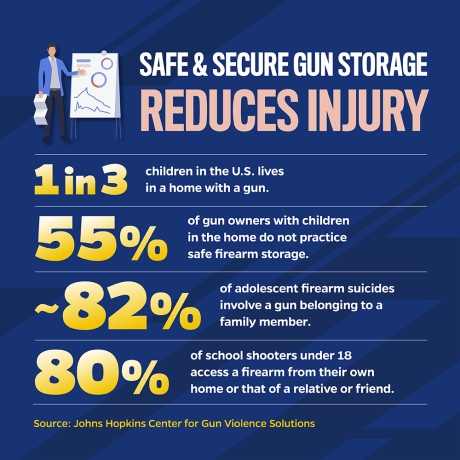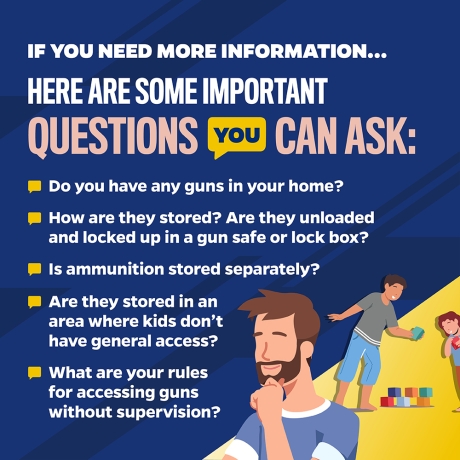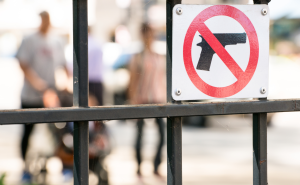Yes, You Should Ask If Someone Has Guns in the Home. Here’s How.
By normalizing conversations about guns in the home and how they’re stored, we can save lives and reduce injuries.

In the United States, one in three children under the age of 18 live in a home with at least one firearm. But in only about half of these homes are all guns stored safely and securely. There were over 2,800 incidents between 2015 and 2022 in which children unintentionally shot themselves or someone else, with nearly a third of those unintentional shooters were preschool-age.
Keeping guns unloaded and locked up is one of the most effective ways we can prevent unauthorized users—including children—from accessing or being injured by firearms.
Cassandra Crifasi, PhD ’14, MPH, co-director of the Johns Hopkins Center for Gun Violence Solutions and a gun owner herself, explains why it’s so important to normalize conversations among parents and guardians about the presence of guns in the home and why it doesn’t need to be a controversial topic.

Is it enough to put a gun up high and out of reach?
It definitely isn’t enough to keep things out of reach. One of the things we love about kids is that they’re curious and they’ll figure things out. I’m sure many of us can recall seeing our parents put the cookie jar out of reach and then finding a way to climb up and get it when they weren’t looking.
Parents who have guns in the home will often say, “No, my kids don't know where I keep it.” But if you ask those same kids, 73% of them know exactly where it is and could get it within a matter of minutes. If we really want to put something out of reach, we should take the same approach we take with household cleaners or medications: Lock them up.
Why does asking about gun ownership feel so awkward, or taboo?
I think part of it has to do with the way guns are talked about in the media: “Nobody agrees on anything. We don't know what works. This is a totally polarized topic.”
These types of narratives do us a real disservice. If I think you might own guns, and what I hear repeatedly in the media is that this is a controversial topic that everyone disagrees on, why would I want to start a conversation about it with you?
What are some ways that parents can feel more comfortable asking about guns if they're planning a playdate or sleepover?
This really comes back to injury prevention and safety principles that we already practice:
- If your kid has a peanut allergy, you’ll have no problem asking another parent to make sure they aren’t fed anything with peanuts in it.
- If you're sending your kids out to ride bikes, you’re making sure they wear a bike helmet.
- If you're in the car, you’re making sure your kid is wearing their seatbelt or in a car seat or booster.
Grouping questions about guns with these other safety topics can help it feel less awkward. For example: “Hey, I've got a list of safety things to chat about before my kid comes over. Do you have a dog? Here are my kid’s allergies. Do you have any guns in the home?” This makes it just one of the things on a larger checklist—not to minimize it, because it is important to talk about, but also to not make it something way bigger than it is.

Do you recommend that someone who owns a gun offer that information if children will be visiting their home? What's a good way to do that?
Yes, and the same approach can be used: “Hey, I have a list of things that I want you to know that I've thought about before your kid comes to my house. The kids are going to watch such-and-such movie. Do you have any concerns about that movie or its PG rating? We have a pool outside, but it’s fully fenced off. We own a handgun, but it’s kept in a locked safe, unloaded, and we keep the ammunition in a separate locked safe.”
Having these conversations is part of the responsibilities that come along with gun ownership. They’re also opportunities for gun owners to promote responsible behavior to other gun owners. I practice safe and secure storage, but my neighbor down the street who I go to the shooting range with may not. And if my kid visits theirs, I want to ask that question because I don't want my kid in a home with guns that aren’t locked up.
When you ask another parent or guardian about guns in the home, what can you do if you don’t feel comfortable with their answers?
Particularly given the current state of gun violence in the U.S., there may be families who don’t want their kids to visit a home with guns, even if they are stored unloaded, locked up, and separately from ammunition. In those cases, there are ways that you can still facilitate social interactions, recognizing that somebody might not be comfortable spending time in a home that has firearms.
If you’re uncomfortable with guns in a playdate host’s home, some alternatives are:
- Offering to host the playdate at your home instead.
- Proposing a different destination, like the library, park, or movies.
- Planning that the kids will only play outside, weather permitting.
What advice do you have for people who just don’t feel comfortable broaching the topic with another family?
I strongly discourage people from putting their kids in situations where you don't know for sure. If you don't feel comfortable asking, you should be willing to host or chaperone at a public location while the kids spend time together.
We’ve seen too many tragedies in which children were injured or injured someone else—perhaps the parents didn’t know how to ask about guns in the home, or didn’t think that they should. If you don't ask and somebody doesn't proactively tell you about guns in their home, you could set yourself up for a potentially avoidable tragedy and lifelong trauma. Risking a little bit of discomfort is a better option than risking a life-changing event that could occur if a child were to find an unsecured firearm.

The fear of discomfort often comes back to myths perpetuated around gun violence, including that it’s a political issue that’s impossible to discuss. Realistically, it’s not likely that asking someone about guns and how they’re stored, amid a checklist of other safety questions, is going to result in a cataclysmic, friendship-ending argument.
We can save lives by making it standard practice to ask about guns in the home and how they’re stored, make sure you're comfortable with the responses, and propose alternatives if not. By doing so, you’re helping to normalize these important conversations.
Aliza Rosen is a digital content strategist in the Office of External Affairs at the Johns Hopkins Bloomberg School of Public Health.





